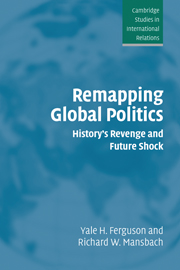Book contents
- Frontmatter
- Contents
- Preface
- Acknowledgments
- 1 Postinternational politics
- 2 Theory and method
- 3 Political space and time
- 4 States and other polities
- 5 Identities in a postinternational world
- 6 A postinternational world economy
- 7 War in a postinternational world
- 8 Technology and change
- 9 The future
- Index
- CAMBRIDGE STUDIES IN INTERNATIONAL RELATIONS
8 - Technology and change
Published online by Cambridge University Press: 22 September 2009
- Frontmatter
- Contents
- Preface
- Acknowledgments
- 1 Postinternational politics
- 2 Theory and method
- 3 Political space and time
- 4 States and other polities
- 5 Identities in a postinternational world
- 6 A postinternational world economy
- 7 War in a postinternational world
- 8 Technology and change
- 9 The future
- Index
- CAMBRIDGE STUDIES IN INTERNATIONAL RELATIONS
Summary
Technological change has always been a factor in world history, but the rate of technological change has accelerated dramatically and especially so during the final decades of the twentieth century. Such change, though crucial in producing the postinternational world, should be regarded as a permissive rather than a compelling cause; that is, it facilitates or impedes other changes like political mobilization regardless of distance. Most importantly, as we have observed, technology is altering the meaning of time and space, redefining “our possible experiences of ‘proximity’ and ‘simultaneity’.” Almost anyone can employ Space Imaging Inc. to take satellite photographs of any territorial space. Forms of political space that are nonterritorial or are only tenuously linked to territory – like global markets, religious groupings, and professional epistemic communities – cannot be photographed but are no less real and substantial. Technological change has played a leading role in devaluing territory with regard to the world economy, warfare, political mobilization, and identity formation – and thus is one of the major reasons why the task of remapping postinternational global politics is so urgently required.
In military affairs, distance and topography are less and less critical when real-time contemporary knowledge of a field of battle allows precision-guided munitions to locate and destroy targets such as a factory in the Sudan or a terrorist camp in Afghanistan from vast distances.
- Type
- Chapter
- Information
- Remapping Global PoliticsHistory's Revenge and Future Shock, pp. 273 - 311Publisher: Cambridge University PressPrint publication year: 2004

